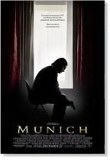|
 Newsweek Article: Catch and Kill Them If You Can
The terrorist act that kicks off Steven Spielberg's "Munich" was seen as it unfolded on television around the world. The Palestinian group Black September invaded the Olympic Village in West Germany in 1972, killed two Israelis and took nine hostages, demanding the release of 234 Palestinian prisoners. All nine were subsequently slaughtered in a shoot-out at the Munich airport. This story was effectively told in the Oscar-winning documentary "One Day in September."
The fascinating story Spielberg tells is what happened after Munich: Israel's secret campaign of retaliation. In this fictionalized account, a team of five men is assembled, led by a young Israeli intelligence agent named Avner (Eric Bana). They're given a list of 11 Palestinians living in Europe, each said to be involved in planning the Munich killings. Their orders are simple: find them, and kill them.
What follows is, as one might expect from Spielberg, a superbly taut and well-made thriller that jumps from Geneva to Rome, from Paris to Beirut, from Athens to Brooklyn, each lethal assignment staged with a mastery Hitchcock might envy. What's unexpected is the tone, the point of view, the morally complex weight Spielberg brings to bear on this story, which is miles removed from the adventure movies that made his name. There's a lot of killing in "Munich," and none of it is pretty; none of it panders to the audience's bloodlust for revenge. The boy who made "Raiders of the Lost Ark" has left the room.
In one sense, this movie is Spielberg's dialogue with himself about the uses and misuses of real world-and movie-violence. This time he doesn't trap himself in the "Saving Private Ryan" paradox: making a supposedly antiwar movie in which the audience is screaming for German blood. With each assassination, the sense of triumph diminishes for the increasingly troubled agents. It also becomes clear that the longer they stay in the game, the more likely they are to become prey themselves.
"Munich" is distinguished by an unusually smart, literate screenplay by playwright Tony ("Angels in America") Kushner, who shares credit with an earlier writer, Eric Roth. The members of Avner's team don't act like stock action characters-and they've been shrewdly cast. Daniel Craig plays their gung-ho South African driver, the most bloodthirsty of the team, whose only priority is defending Jewish blood. An unusually buttoned-down Ciaran Hinds is the fastidious clean-up man, riddled with doubts. Where's the evidence, he wonders, that the men they're killing were actually tied to Munich? Hanns Zischler is a German Jew who is an expert at document forgery, and Mathieu Kassovitz is the volatile Belgian toymaker who constructs their bombs, which tend not to explode exactly as planned. Two great French actors-Michael Lonsdale and Mathieu Almaric-have small but juicy father-son roles as Avner's Paris sources, the apolitical men who can, for a steep price, tell Avner where to find his targets.
The notion of home haunts all the characters in the movie. Avner leaves his behind, along with his pregnant wife (Ayelet Zorer), when he takes his job. By the time he returns to her, he's a changed man, paranoid, deadened, with too much blood on his hands. This is often the point, late in his movie, when Spielberg loses his nerve and grasps for a tidy, sentimental wrap-up. Not this time. "Munich" gets darker, more ambiguous, more disconsolate as it goes.
Though the movie is set in the ' 70s and shot in a gripping, nervous cinematic style influenced by the ' 70s thrillers of Friedkin and Pakula (remember zoom lenses?), it becomes increasingly apparent that Spielberg and Kushner are describing the world we're living in now. Early on, Avner is summoned into a room with Golda Meir, who makes an adamant case for swift, savage retribution. Sometimes, she says, with the slightest hint of regret, we have to make compromises with our own values. And sometimes, this cautionary tale shows us, there are consequences we can't control. "Munich" starts as a movie about revenge and ends as a movie about blowback.
Newsweek, Dec. 19, 2005 issue.
|
 |